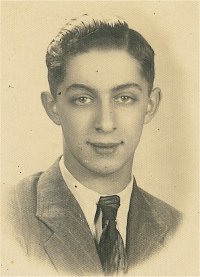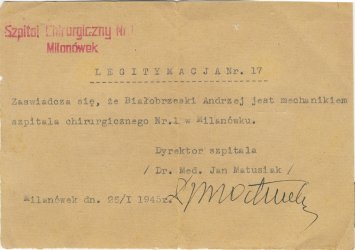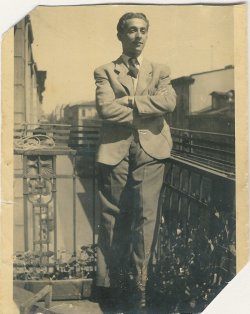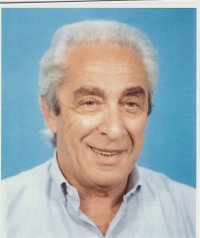
Leon Kopelman
born April 26, 1924 in Warsaw
survived from the Warsaw Ghetto
volunteer soldier of "Zoska" battalion
Home Army union "Radoslaw"
The Witnesses' Uprising Reports
The Wartime Memoirs of Leon Kopleman
The 1944 Uprising and liberation
 |
|
When the Uprising started on the 1st of August 1944, Germans decided to move us from Pawiak to Gesiowka. Before the Uprising broke out we had no signals indicating it would actually take place. We understood what was happening when the Germans took us out from Pawiak.
We weren't sure whether they just wanted to move or to kill us, because on the way between Pawiak and Gesiowka there was a square where the Germans used to execute people. We knew the way and the facts, that was why we agreed that if we approached the executions' square we would all run in different directions there, so these who were supposed to be saved, would. If we, on the other hand, took the road to Gesiowka, we would all remain calm.
It turned out that the guardsmen were taking us to Gesiowka. There were already Germans and Greek Jews brought form Auschwitz there. They were busy gathering all valuable object from the houses in the Ghetto, which was entirely empty right now, since all the Jews were transported to the camps. Greek Jews wore striped clothes made of paper and froze in them, because the weather changed a lot and they didn't have anything other to wear. They had to work everyday and the Germans did everything to make their lives even more miserable, for example forced them to carry bricks on their way to work. We tried to help them since our conditions were slightly better and they didn't get anything to eat.
Couple of days later, I can't recall the date exactly, Pawiak was taken by the Home Army. Infantry and tanks came to liberate us from Gesiowka and the insurgents took captive those who used to monitor us - the Germans and the Ukrainians.
When the Uprising broke out one of the men I knew, a limping locksmith, managed to get through the dug tunnel from the carpenter's shop to the city. My another acquaintance, Mr. Bielecki, who lives in Israel now, hid in the bunker in the Old Town and lived there for a couple of months until the city was liberated. When he finally left the bunker he had a long beard, since he couldn't shave there.
My school time friend, Fredek Ajdelbaum, was rescued as well. After the Ghetto was shut, together with his family he was accommodated secretly by the Polish man, Mr. Jozef, whose surname I unfortunately don't remember. He hid in the bunker during the Uprising in 1944 and until Warsaw was liberated by Russians.
We broke into the German warehouses from which we took uniforms and weapons - rifles. I don't remember exactly what kind of those we took, but they were probably short machineguns. We immediately registered with the Home Army, and later we fought together with them in the Old Town. We were in the unit called "Zoska" battalion. The insurgents had 2 tanks, which they captured from the Germans. Together with the "Zoska" soldiers we were in the Old Town, which was seriously damaged because the Germans were permanently raking it with Nebelwerfer missiles. They were incendiary bullets which constituted a terrible weapon and a great danger.
Unfortunately, I don't remember the names and pseudonyms of people who were with me in "Zoska" and I can only recall the names of the Jews from Pawiak who joined in with me. Among others these were Filar and Wisnia. Filar died a soldier's death in the Uprising and was awarded for his courage. Mr. Wisnia stayed in Poland after the war ended, and he died there few years ago. I remember vividly that there was a young lieutenant there, who was severely wounded with a shrapnel. Together with a friend we got a carriage and transported him to the temporary hospital which was in the Old Town. Because of the weapons we had, we fought as soldiers and not liaison officers or orderlies.
Heavy fighting lasted for some time until we were totally surrounded and knew that there was no chance of saving ourselves. One night in the end of September we crossed the sewers from the Old Town to the Centre. The journey was obviously very unpleasant because the sewers were dark and smelly. There was a guide with us, who probably knew the way and after several hours we went out in the Centre. I'm not sure, but I assume we left the canal at the corner of Nowy Swiat and Warecka street.
The life in the Centre was utterly different form what we knew because it was fairly peaceful then as The Germans were busy attacking the Old Town. The people created temporary governing bodies, offices and the atmosphere was quite pleasant. As we came from the Old Town tired and dirty, with guns which were still quite rare in the Centre, we were welcomed very warmley there.
I recall visiting my old home at 7 Krucza street, where I used to live before the war. I met my old friends and neighbours there. When they saw me they were pleased and surprised; "Lolek, you are still alive?" they kept repeating. They found it difficult to believe that I survived and came with the Home Army, with a gun in my hand.
After the defence of the Old Town was shut down, the Germans started attacking the Centre. We moved from there to Czerniakow, where the heavy fighting started soon. The Germans were severely battering us and attacking us with tanks and missiles. One interesting event was a meeting with the soldiers of what we thought was the Red Army, but it turned out these were Polish soldiers recruited in Russia to the so called Berling's Army. They came across the Vistula River as a support. Finally, we all concentrated defending a house in Czerniakow. There were the Red Army soldiers with us. They used radios to direct the fire from their tanks, which were on the other river bank, to destroy German tanks.
It finally came down to the last house that kept defending itself. Civilians hung a white sheet from the window to signal that we give up. In the end we were all taken captive and brought to Szucha Avenue, where the Gestapo main headquarters was. We were held there for 2 days and I was afraid that the Germans, who knew us from the Dynasy garages, would recognize me. Luckily, it didn't happen.
The Germans took us from Szucha to a church in Wola. Some Hungarian Jews, once brought from Auschwitz to Gesiowka, were there as well. Two of them addressed one German and told him they were from Auschwitz and had nothing to do with the Uprising. The soldier answered their concerns by shooting them on the spot.
From Wola we traveled to Pruszkow. There were huge hangars there where the selection of people took place. The captives form the Home Army were sent to the POWs in Germany, young civilians were taken to work in Germany, and the elderly and children were sent to different parts of the General Government, which was under the German occupation.
I didn't feel too confident. It was obvious that if it came out I was a Jew, I wouldn't have any chances of survival. I turned to the Home Army members asking them for help. They told me that the head of this hangar was from the Home Army too, so it was possible for him to give me a hand. Then he explained to me that every evening the Germans did a selection and sent all young people either to captivity or to work.
He offered to hide me in a small storage room which was in the hangar for the time of the selection. Apart from me there was a lady hiding there and two boys form the Home Army. When the Germans were done the man asked me if there was anything else he could do for me. I answered I had no ID. He took me to his office where he had a lot of various documents, including German Kennkarts, and told me to pick something which I found suitable. I chose a Kennkarte under the name Andrzej Bialobrzeski. It became my new identity from then on.
Then I was supposed to meet with a female doctor from the camp, named Dr Kielbasinska. She was a Volksdeutch, had a Polish husband and was looking for an alibi in order not to have problems after the war. She went to see the head of the camp, a German, and got a document from him, allegedly for some worker, stating that the man was suffering from tuberculosis. She told me that when she would be going home from Pruszkow to Milanowek I was to go with her, so that she could get me out of the camp.
So it happened. We arrived to Milanowek where she told me:" You are free now, you can go wherever you want." I answered that I had no particular place to be and I would gladly work in the hospital. It was No.1 Surgical Hospital in Milanówek, situated in the villa called "The Pearl", and its chief was Dr Jan Matusiak. A lot of insurgents form the Uprising were treated there. I was mainly working as an orderly but I was doing other works as well. The staff, which included also Polish nuns working as nurses, didn't know I was Jewish, although some of them may have assumed it. I spoke Polish fluently, therefore, everybody I knew took me for a Polish, not a Jew.

The pass from the Milanowek hospital, under the name Andrzej Bialobrzeski
When I was in Milanowek I found out where the lieutenant from the Uprising, injured in the Old Town whom I mentioned before, lived and I went to see him. When we met he advised me to join the Home Army in Kielce, and even gave me the letter of recommendation. He wrote there that despite my Jewish origins I was a brave and skilled soldier. I didn't like this Jewish part and decided to stay in Milanowek.
Once in the hospital I was asked for help. There was a patient there, a captive, probably French, and since I knew some languages I was asked to talk to him. When I was left alone with him in the room I recognized the alleged Frenchman. He was one of the Greek Jews I knew back from Gesiowka. His name was Ino Varsano but he introduced himself as Jean Vearsaneux. I asked what was his problem and he told me he was healthy but needed help.
I wasn't sure how to handle this situation. Finally, I decided to send him to the countryside, 14 kilometers outside of Milanowek, where the hospital held a home for convalescents, who were almost healthy but needed some more time to rest. I told in the hospital that the "Frenchman" needed that as well. The only means of transport between the hospital and the home was a horse carriage which we used every week to send some food to the countryside. One day we sent the "Frenchman" on the carriage too and he stayed there until the end of the war. From time to time I gave him my regards via carrier, but I never heard back form him.
In January the Russian offensive took place. They liberated Milanowek and Eastern Poland on their way to Germany. After that I immediately left to Warsaw on foot, which was an approximately 30 kilometers journey. I arrived to Praga and saw the part of the city on the left riverbank entirely destroyed. At Praga everything remained unchanged. There were many saved Jews there, they established a Jewish community centre there, run an office and completed lists of people who survived. We lived there until the May of 1945 when the war was over.

Leon Kopelamn in Warsaw after the liberation in 1945
After the liberation I met my Greek - French friend at Praga. He learned some Polish and worked as a driver for the Wedel factory.
Leon Kopelman
translated by: Małgorzata Kwiatkowska

|
Leon Kopelman born April 26, 1924 in Warsaw survived from the Warsaw Ghetto volunteer soldier of "Zoska" battalion Home Army union "Radoslaw" |
Copyright © 2009 Maciej Janaszek-Seydlitz. All rights reserved.